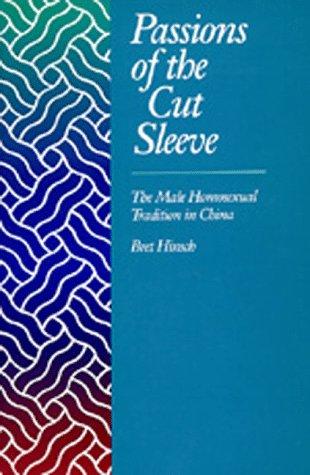Paperback, 256 pages
English language
Published Dec. 29, 1992 by University of California Press.

Paperback, 256 pages
English language
Published Dec. 29, 1992 by University of California Press.
The first detailed treatment of the Chinese homosexual tradition in any Western language, Passions of the Cut Sleeve shatters preconceptions and stereotypes. Gone is the image of the sternly puritanical Confucian as sole representative of Chinese sexual practices—and with it the justification for the modern Chinese insistence that homosexuality is a recent import from the decadent West. Rediscovering the male homosexual tradition in China provides a startling new perspective on Chinese society and adds richly to our understanding of homosexuality.
Bret Hinsch's reconstruction of the Chinese homosexual past reveals unexpected scenes. An emperor on his deathbed turns over the seals of the empire to a male beloved; two men marry each other with elaborate wedding rituals; parents sell their son into prostitution. The tradition portrays men from all levels of society—emperors, transvestite actors, rapists, elegant scholars, licentious monks, and even the nameless poor.
Drawing from dynastic histories, erotic …
The first detailed treatment of the Chinese homosexual tradition in any Western language, Passions of the Cut Sleeve shatters preconceptions and stereotypes. Gone is the image of the sternly puritanical Confucian as sole representative of Chinese sexual practices—and with it the justification for the modern Chinese insistence that homosexuality is a recent import from the decadent West. Rediscovering the male homosexual tradition in China provides a startling new perspective on Chinese society and adds richly to our understanding of homosexuality.
Bret Hinsch's reconstruction of the Chinese homosexual past reveals unexpected scenes. An emperor on his deathbed turns over the seals of the empire to a male beloved; two men marry each other with elaborate wedding rituals; parents sell their son into prostitution. The tradition portrays men from all levels of society—emperors, transvestite actors, rapists, elegant scholars, licentious monks, and even the nameless poor.
Drawing from dynastic histories, erotic novels, popular Buddhist tracts, love poetry, legal cases, and joke books, Passions of the Cut Sleeve evokes the complex and fascinating male homosexual tradition in China from the Bronze Age until its decline in recent times.